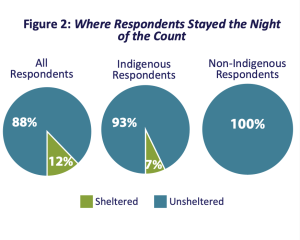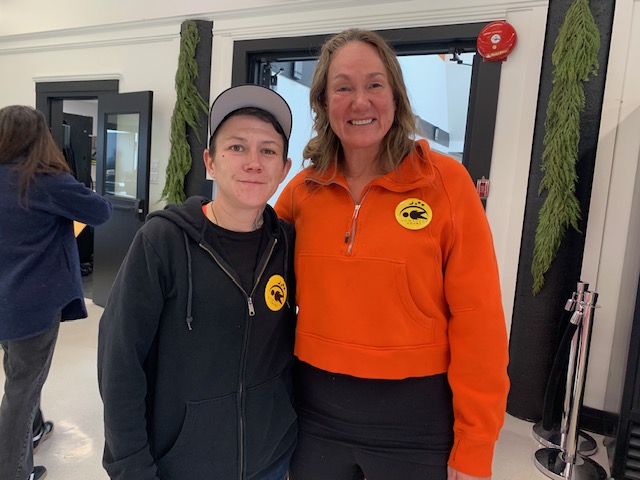FOR IMMEDIATE RELEASE
October 20, 2025 – Smithers, BC
The Dze L K’ant Friendship Centre, in partnership with the Homeless Services Association of BC (HSABC) is proud to announce the completion of the 2025 Provincial Homeless Count in Smithers, with the announcement of the homeless count results.
For many years, Smithers has participated in the Provincial Homeless count, a Point-in-Time (PiT) count offering a one-day snapshot of how many people are experiencing homelessness in a community. The count is conducted via a survey which gathers a range of information about who is experiencing homelessness, what experiences and challenges participants are facing and what services are being accessing. In recent years the Dze L K’ant Friendship Centre has partnered with HSABC to ensure the count is coordinated through a distinctly cultural and community-led approach.
Under the guidance of our Homeless Count Coordinator Chrissy Scaplen, with the full participation of Friendship Centre staff, the count was conducted in Smithers on April 23, 2025. This approach brought together outreach services, cultural connection, and community support.
As part of this effort, the Friendship Centre hosted a luncheon at the Indigenous Cultural Centre, where people experiencing

 homelessness had an opportunity to gather, share a delicious meal, receive gifts of acknowledgement, and share their experiences in a supportive environment. Staff were on site to help community members complete provincial homeless count surveys and ensure that every person who wished to be counted had the opportunity to do so.
homelessness had an opportunity to gather, share a delicious meal, receive gifts of acknowledgement, and share their experiences in a supportive environment. Staff were on site to help community members complete provincial homeless count surveys and ensure that every person who wished to be counted had the opportunity to do so.
“Our team is proud of our commitment to ensuring that everyone in our community—especially Indigenous people who are often left out of mainstream systems—was seen, heard, and counted,” said Chrissy Scaplen, Team Lead for the 2025 Smithers Homeless Count. “This process was grounded in respect, inclusion, and cultural safety.”
Key findings
The 2025 Homeless Count identified 77 people experiencing homelessness in Smithers, these results represent increases from previous homeless counts. For example in 2023 the count found 57 individuals experiencing homelessness. Of those who participated in the count in 2025, 84% identified as Indigenous, compared to 12% of the census population, reflecting a continued gross overrepresentation of Indigenous people among those experiencing homelessness.
 88% of respondents were unsheltered on the day of the count, meaning they were either living outdoors, staying temporarily in a motel or couch surfing. 93% of Indigenous participants were unsheltered. These results demonstrate limited access to shelter services to meet the needs in our community.
88% of respondents were unsheltered on the day of the count, meaning they were either living outdoors, staying temporarily in a motel or couch surfing. 93% of Indigenous participants were unsheltered. These results demonstrate limited access to shelter services to meet the needs in our community.
The data highlights that most individuals experiencing homelessness in Smithers are long-term residents, with 79% of participants reporting they have limited in the community for more than five years and 53% reporting they have always lived in the community. This data is particularly important, demonstrating that we do not have a high level of transience and that people experiencing homelessness have strong and longstanding connections to this community.
The findings also show the deep connection between complex trauma and addictions, with 64% of all respondents reporting co-occurring mental health and substance use challenges. 53% of respondents had been in foster care as youth, and 57% of Indigenous respondents had experienced foster care as a youth, illustrating the connection between systemic factors such child removal systems and homelessness.
Call for Indigenous-Led and Trauma-Informed Solutions
These results make clear the urgent need for housing, supports, and mental health and addictions services in Smithers—particularly those that are low barrier and Indigenous-led and trauma-informed. It is critical that trauma informed solutions are pursued to support those experiencing unsheltered homelessness.
“Homelessness in our community is not just about a lack of housing,” said Nox Stikine, Annette Morgan, Executive Director of the Dze L K’ant Friendship Centre Society. “The experience reflects the ongoing impacts of colonialism, trauma, and systemic inequities. We will continue to advocate with our partners for Indigenous-led, culturally grounded approaches in order to create meaningful change.”
The Dze L K’ant Friendship Centre remains committed to working collaboratively with all levels of government, service providers, and community members to advance safe, supportive, and culturally appropriate housing solutions for Indigenous and non-Indigenous people alike. Our organization is developing 37 units of Indigenous housing in Smithers which will be available in early 2026 as well as 41 units of Indigenous housing in Houston which will be available in early 2027.
Media Contact:
Dze L K’ant Friendship Centre Society
Nox Stikine, Annette Morgan
250-847-5211
www.dzelkant.com

